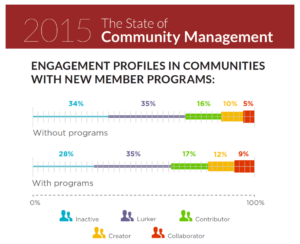By Ted McEnroe, The Community Roundtable
A few weeks ago, I had the chance to talk with members of TheCR Network about Best Practices in New Member Programs. It was a great, member-driven sharing of ideas and approaches to using welcome programs as an opportunity to begin getting members involved and contributing to your community.
The discussion was for TheCR Network members only, but in preparation for it, I took a look again at the data we collected for the State of Community Management 2015 report, where we singled out new member programs as one of the “quick wins” you could take advantage of to improve engagement in your community.
 In the SOCM, we note that not only do communities that have new member programs get higher engagement levels than those without, we note that there are a few new member approaches that get the highest engagement levels – personal emails, video tours and welcome calls. (Click here to download the SOCM and see the charts.)
In the SOCM, we note that not only do communities that have new member programs get higher engagement levels than those without, we note that there are a few new member approaches that get the highest engagement levels – personal emails, video tours and welcome calls. (Click here to download the SOCM and see the charts.)
Looking at the survey responses, I noted that easily reproduced/automated items like Getting Started guides and automated welcome letters were the most common elements of welcome programs, while other items like welcome calls, video tours and personalized emails were less common.
But interestingly, I noticed something else. It was those less common tactics that correlated with a much higher rate of engagement and member content creation.
As I looked at it– it struck me that in every general instance, the more human the approach, the more successful it was. Note that human doesn’t have to mean personal. Personal is important, and personal outreach can be powerful – especially with executives and other key stakeholders whose needs and perspective are uncommon or unique. What human means is that the more the approach connects with the audience as individuals, and the better it is at presenting the community as a human entity, the greater the engagement.
Some examples:
Personal emails beat automated emails: Why? You know my name!
Personalizing an email in this day and age isn’t a heavy lift. With templates, smart email programs and more, making an email somewhat personal is very easy. Adding a human element of your own, if you can, is even better – and personalized emails outshine the automated in terms of community engagement.
Video welcome tours beat getting started guides: Why? I see your face.
The getting started guide is a great tool, and it may be necessary reference material for community members. But even the best of them aren’t likely to inspire me as a new member to say, “OMG, I totally want to be a part of that community!” What might? Seeing a human face telling me about the features of the community and what makes it a valuable place. Now, even before I get started, I can picture what a member looks like. (Also a reason why getting members to post profile pictures has good value.) Presumably, I join communities to connect with people, not use architecture, so it makes sense that seeing those people increases the likelihood I’ll engage.
Welcome calls beat welcome webinars: Why? I connect with you.
There is an asterisk here – in that a well-crafted webinar can create interaction, too. But in general, a canned webinar for new members cannot replace an actual human being calling them. There are practical reasons why this won’t work for every community, but if you think about it, there’s nothing that drives home that your community is run by actual people like letting new members speak with one of them.
Not to mention that there is no better way to get to know your community members than to, umm, personally get to know your community members.
The research shows there is no magic bullet for new members – and communities should mix and match their methods to fit their needs. But in general, when thinking about how to get new members connected to the community – the approach is simple.
Put a human face on it.
